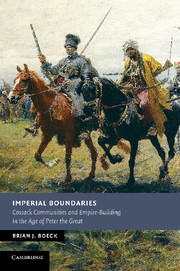Book contents
- Frontmatter
- Contents
- List of maps and illustrations
- Acknowledgments
- List of abbreviations
- 1 The Don region
- 2 The wider world of the Don steppe frontier
- Introduction
- 1 Beyond borders, between worlds: Russian Empire and the making of the Don steppe frontier
- 2 People and power on the frontier: liberty, diversity, and de-centralization in the Don region to 1700
- 3 A middle ground between autonomy and dependence: the raiding economy of the Don steppe frontier to 1700
- 4 Boundaries of integration or exclusion? Migration, mobility, and state sovereignty on the southern frontier to 1700
- 5 Testing the boundaries of imperial alliance: cooperation, negotiation and resistance in the era of Razin (1667–1681)
- 6 Between Rus' and Rossiia: realigning the boundaries of Cossack communities in a time of migration and transition (1681–1695)
- 7 The era of raskol: religion and rebellion (1681–1695)
- 8 Incorporation without integration: the Azov interlude (1695–1711)
- 9 From frontier to borderland: the demarcation of the steppe and the delegitimization of raiding (1696–1710)
- 10 Boundaries of land, liberty, and identity: making the Don region legible to imperial officials (1696–1706)
- 11 The Bulavin uprising: the last stand of the old steppe (1706–1709)
- 12 Reshaping the Don in the imperial image: power, privilege, and patronage in the post-Bulavin era (1708–1739)
- 13 Closing the Cossack community: recording and policing the boundaries of group identity (1708–1739)
- 14 A borderline state of mind: the closing of the Don steppe frontier (1708–1739)
- Afterword
- Index
- References
7 - The era of raskol: religion and rebellion (1681–1695)
Published online by Cambridge University Press: 12 January 2010
- Frontmatter
- Contents
- List of maps and illustrations
- Acknowledgments
- List of abbreviations
- 1 The Don region
- 2 The wider world of the Don steppe frontier
- Introduction
- 1 Beyond borders, between worlds: Russian Empire and the making of the Don steppe frontier
- 2 People and power on the frontier: liberty, diversity, and de-centralization in the Don region to 1700
- 3 A middle ground between autonomy and dependence: the raiding economy of the Don steppe frontier to 1700
- 4 Boundaries of integration or exclusion? Migration, mobility, and state sovereignty on the southern frontier to 1700
- 5 Testing the boundaries of imperial alliance: cooperation, negotiation and resistance in the era of Razin (1667–1681)
- 6 Between Rus' and Rossiia: realigning the boundaries of Cossack communities in a time of migration and transition (1681–1695)
- 7 The era of raskol: religion and rebellion (1681–1695)
- 8 Incorporation without integration: the Azov interlude (1695–1711)
- 9 From frontier to borderland: the demarcation of the steppe and the delegitimization of raiding (1696–1710)
- 10 Boundaries of land, liberty, and identity: making the Don region legible to imperial officials (1696–1706)
- 11 The Bulavin uprising: the last stand of the old steppe (1706–1709)
- 12 Reshaping the Don in the imperial image: power, privilege, and patronage in the post-Bulavin era (1708–1739)
- 13 Closing the Cossack community: recording and policing the boundaries of group identity (1708–1739)
- 14 A borderline state of mind: the closing of the Don steppe frontier (1708–1739)
- Afterword
- Index
- References
Summary
The Don region in the 1680s provides a complex picture of interaction between Russians and non-Russians, Orthodox and others, and Cossacks and nomads. In an era in which religious rebels from Russia fled to the steppe and established common cause with Muslim rulers and in a period in which the tsar mustered the support of Cossacks, Kalmyks, and even Chechens to prevail in a regional struggle with Orthodox dissidents, it becomes problematic to frame Russia's steppe frontier in terms of religiously motivated Russian state expansion. This brief but important episode in the history of the Russian steppe was not about an aggressive Orthodox Third Rome crusading against the non-Christian peoples of the steppe frontier, but about religious dissidents trying to use the steppe as a staging ground for taking Russia back from the Antichrist.
In the last decades of the seventeenth century, as strong currents of dissent inundated the decentralized world of the Don River, the Don Cossack fraternity was pushed to the brink of fratricide. The fate of the Don Cossack Host hinged upon resolving differences between haves and have-nots, representatives of northern and southern communities, defenders of Nikonian Orthodoxy and Old Ritual, and supporters and opponents of Moscow. A great schism (raskol) challenged the region's relationship with the Russian government and provoked a civil war that sent roughly one in ten Don Cossacks in search of sanctuary in the North Caucasus.
- Type
- Chapter
- Information
- Imperial BoundariesCossack Communities and Empire-Building in the Age of Peter the Great, pp. 103 - 116Publisher: Cambridge University PressPrint publication year: 2009



